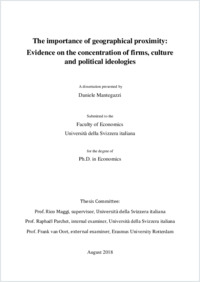The importance of geographical proximity : Evidence on the concentration of firms, culture and political ideologies
- Mantegazzi, Daniele
- Maggi, Rico (Degree supervisor)
-
07.08.2018
107 p
Thèse de doctorat: Università della Svizzera italiana, 2018
Agglomeration spillovers
Economic geography
Firm performance
Culture and soft institutions
Political ideologies
English
This dissertation proposes three empirical essays focusing on the importance of geographical concentrations along various dimensions in regional economics, dealing with topics regarding agglomeration spillovers, firm performance, culture and soft institutions as well as the geographical concentration of political ideologies. The first chapter aims at empirically verifying whether agglomeration spillovers affect a particular indicator of firm performance, namely firm solvency, which, in turn, determines firms’ ability to borrow. The results show that agglomeration mechanisms shape firm’s credit accessibility, along with the characteristics of the firm itself and geographical information. As highlighted by the economic literature, this has in turn implications on firm’s investment possibility and therefore on their ability to strengthen their productivity. In the second chapter, the goal is to examine empirically whether the spatial scale of the different types of agglomeration spillovers shape and/or are shaped by cultural and soft institutional discontinuities, as reflected by linguistic differences between localities. The findings of this study demonstrate that the economic geography of agglomeration spillovers is mediated and altered by linguistic discontinuities and this has not been modelled nor considered before. Finally, the third chapter proposes a new definition of spatial cohesion, based on the geographical concentration of political ideologies, and aims at empirically identifying whether there is any spatial concentration of political ideologies and verify whether these concentrations are correlated with income and income inequality. The results of this study indicate the existence of spatial concentrations of Swiss municipalities sharing the same political ideology and show that these concentrations are correlated with income and income inequality. In general, the findings of the analyses contained in this thesis contribute to the current discussion on the importance of geographical proximity, by empirically demonstrating that distance still represents an obstacle for various processes in economics, against the view that the world has become “flat”.
- Language
-
- English
- Classification
- Economics
- License
-
License undefined
- Identifiers
-
- RERO DOC 323042
- URN urn:nbn:ch:rero-006-117602
- ARK ark:/12658/srd1318804
- Persistent URL
- https://n2t.net/ark:/12658/srd1318804
Statistics
Document views: 398
File downloads:
- Texte intégral: 235
